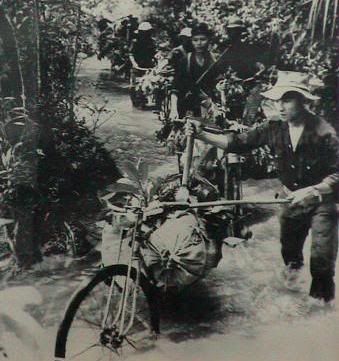1) So why might electric-assisted bikes be a good idea for some niches?
It is of course difficult to imagine a whole company of light infantry biking from A to B as happened a hundred years ago. As stated before there are several interesting, if restricted uses:
a) Possibly the most interesting use of such an ebike might be as a light additional vehicle to support various little tasks like reconnaissance, observation, communication and traffic control. With around 25 kg it is light, if unwieldy, it could be easily slapped on various vehicles from trucks to scout cars. A relative cheap price means that losing it/leaving it behind for various reasons is far from a big deal.
For example an ebiker could quickly and silently reach a point of interest like the vicinity an potential OP or LP over a narrow trail.* He may rapidly distribute a couple of small sensors like mini-cameras at various locations. Or quickly reach a section of a road to direct traffic, bypassing it with little problems. With a push-assist it might be quite useful in quite difficult terrain to support a squad over a not-so short distance.
2) Why wouldn't mature ICE bikes be the better choice in those?
Compared to proper motorcycles like enduros it might have some big advantages:
a) Lightness
b) Silent operation
c) Ease of use
d) Lower price
e) Development potential
Of course there should be big disavantages as well:
a) Range
b) Refueling/Recharging
c) Speed
d) Load capacity
e) Maturity
Obviously both approaches can co-exist and most of the mentioned points are tendencies.
I will continue later on those and try to go into more details. So far for most applications something around an Macina freeze or Macina Lycon 27.5 GP+ with push-assist and a more powerful engine is in my mind. 2WD might be an option.°
*The bike battery might be used to recharge various others in stuff from micro-drones to communication gear.
°Right now the weight seems to be spend better for something else like more battery power. Compared to ICE motorcycle it is far easier and less cumbersome to add.




 Reply With Quote
Reply With Quote










Bookmarks